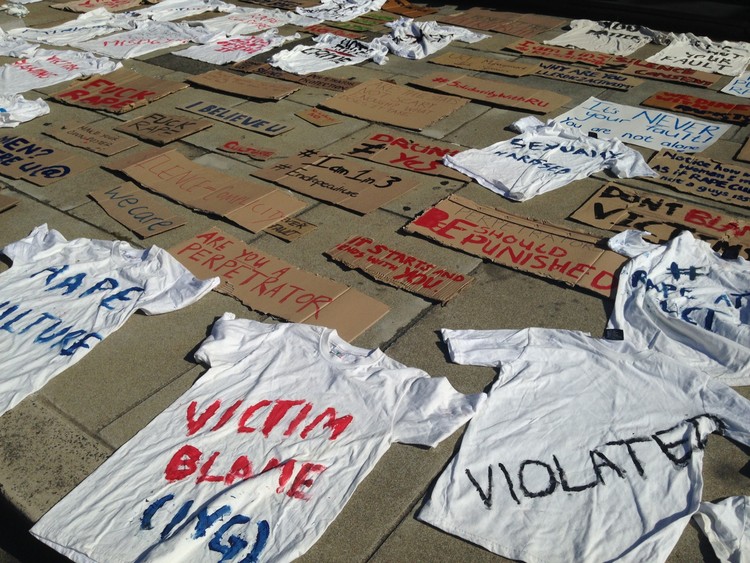
13 December 2024
T-shirts and placards on display at a protest against rape. Archive photo: Stephanie Kelly
The annual 16 Days of Activism against Gender-Based Violence campaign ended this week, but for many women in rural areas it amounts to little more than window dressing.
The Limpopo Mirror spoke to a middle-aged woman from a village close to Thohoyandou last week. She has been a victim of rape twice in less than five years. In both cases, the system appears to have failed her.
She moved to Ngwenani in 2004 and lived alone in a two-roomed house until the night of 29 February 2020.
In the middle of the night, an intruder broke into her home, using a spade to force open the door. The assailant, later identified as a 21-year-old man from the same village, threatened to kill her if she made a sound.
He raped her and remained in her home afterwards, falling asleep in her bed. She escaped. She returned with her neighbour. They found the attacker still asleep. The neighbour used a spade to scare him off.
The following morning, she reported the rape to the royal kraal before heading to the Thohoyandou police station to open a case. She was referred to a trauma centre, where she was examined by a doctor and gave a statement to the police officer.
The suspect was arrested on 6 March 2020. She hoped he would face justice. However, what followed were years of delays, threats, and frustration.
It was not until 24 August 2023 that the suspect made his first regional court appearance. In the interim, he had been imprisoned for other crimes. He repeatedly sought to have the rape case postponed until he had completed those sentences.
In July 2024, he was released without the authorities informing her. Soon after, she said he contacted her, and threatened to kill her. He also boasted about his criminal record, claiming he was untouchable and could not be kept in prison.
She laid a charge of intimidation, but he was not arrested. Only after informing a senior SAPS officer, was any action taken. He was arrested but released on bail a few days later.
On 10 December 2024, the rape case was on the court role for the 23rd time in the Sibasa Regional Court.
Once again, the case was remanded, this time to 11 February – almost exactly five years after the assault. The accused remained in custody after this appearance, but may be released again.
Tragically, his victim has endured a second rape in 2022 when another intruder broke into her house at night. This attacker strangled and sexually assaulted her. She prayed aloud while he raped her.
“He had a lot of condoms. He would wear one and hold another in his hand,” she said. The attacker was disturbingly casual about his actions, telling her he planned to leave at 6am.
“I told him, if you’re going to leave in the morning, go and close the entrance you used to come in,” she recalled. The rapist left through the window and did not return. He remains at large, leaving her living in fear.
“I don’t feel safe here anymore,” she said. “These men are out there, and I live in constant fear for my life.”
She has called on the police and community leaders to take stronger action to ensure her safety and bring the perpetrators to justice.
Fiona Makondelele Nicholson, an advocate for gender-based violence survivors, said the case reflected the experiences of many rape survivors.
Nicholson, founder of the Thohoyandou Victim Empowerment Programme and head of PracSol NPC, said, “When her case first went to court in August 2023, three-and-a-half years after the assault, the suspect appeared in prison garb and ankle chains. He kept claiming to be too sick to stand trial and argued that the rape case should only proceed after he had completed his current sentence.”
Nicholson said after his release, the accused continued his intimidation.
“In July this year, he followed her down the road, threatening to kill her. She ran into a stranger’s house, but he followed her inside and repeated the threats in front of witnesses. She opened a case the same day, but the police did not arrest him.”
The Family Violence, Child Protection and Sexual Offences unit said they could not act because intimidation fell under a different section.
Nicholson’s intervention led to the suspect’s eventual arrest. She also insisted that the rape and intimidation cases be linked.
“The Regional Court in Sibasa said the cases should be linked, but four months later, they still have not done so. The magistrate hearing the rape case will not know he threatened to kill her,” Nicholson said.
The mishandling of the case has resulted in 23 postponements.
“The last time her case was in court, during the 16 Days of Activism, we sat through three hours of speeches. By the time they finished, it was too late to proceed with her case,” Nicholson lamented.
She also criticised the police for failing to follow standard operating procedures.
“Eight days after the rape, a friend of hers contacted me to say the police had not collected the semen-stained sheets she told them about. I intervened, and prints were eventually taken 12 days after the rape. They never matched the fingerprints.
“The second rapist was identified through DNA in February, but he was never arrested. I intervened again, and they finally issued a warrant of arrest last month, but when they couldn’t find him, they closed the docket,” she said.
Nicholson called for national reforms. “The truth is, all they have to do is follow their standard operating procedures, which they consistently fail to do. This is not just a Limpopo problem; it is a national issue.”
Co-published with the Limpopo Mirror